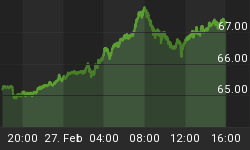Ever since Robert Rubin began the tradition in the mid-1990s, it has been a significant element of the Treasury Secretary's job description to continuously state that a strong dollar is in the national interest. It is widely regarded that such utterances, if repeated often enough, can constitute the sum total of what is still laughingly known as the nation's "strong dollar policy."
Over the past two generations, the American government has launched many failed campaigns. To name just a few, there has been the war on drugs, the war on poverty, and the continued attempts to improve education. But the strong dollar policy must be seen as the poster child for all failed Federal policies. However, many in the market took cheer that the policy is now being greatly expanded. In an unprecedented move, the Fed Chairman is now adding his voice to the chorus and using the same rhetoric previously used by Treasury alone. That's two people saying the words...not just one. A double barrel strong dollar policy!
As the administration is so fond of saying, a nation's currency reflects the underlying strength of its economy, and in that sense can be seen as a nation's economic report card. In truth, a strong currency is in the interest of every nation, just as good grades are in the interest of every student. Using this basic analogy, a flunking student cannot improve his grades by simply telling his parents, teachers, and fellow students that he has adopted a "straight A policy." If his words are not accompanied by a change in actual behavior, whereby he stops cutting class, and starts studying more, his new policy is unlikely to achieve results. So long as his bad habits persist, the policy will not be any more effective simply because one of his friends chimes in.
In his speech this past Tuesday, Ben Bernanke finally admitted that the weakness in the dollar was contributing to both higher inflation and elevated inflation expectations. This stands in stark contrast to his recent testimony in front of the House Banking Committee, where in response to a question asked by Congressman Ron Paul, he confidently declared that the weakness of the dollar only effected Americans who travel abroad. It is amazing how little attention this complete reversal received.
The media of course wasted no time in declaring that Bernanke's speech heralded the opening of a new front in the campaign against the falling dollar. For example, CNBC's Larry Kudlow proclaimed that Bernanke had endorsed "King Dollar" (someone needs to remind Kudlow that the king has long since abdicated his throne) and the network ran an entire segment on how to profit from the new dollar rally. All of this because Bernanke merely mentioned the dollar, acknowledged its effects on inflation, and expressed concern for its plight. As far as the media and Wall Street are concerned, words without action are enough. Too bad that's not the way things work here on the planet Earth.
The real take away from Bernanke's comment is not that the dollar is about to rally, but that it is now more likely to sink even lower. I believe the main reason Bernanke has refrained from mentioning the dollar in the past is that he did not want to be put in a position of actually having to do something about its decline. He is now so fearful of an imminent dollar collapse that he must have felt compelled to throw down the gauntlet despite his fear that someone might actually pick it up.
My guess is that currency traders will ultimately see this as an act of desperation. When the dollar keeps falling a chorus will swell to demand that the Fed put teeth in its new policy. If Bernanke does nothing the world will finally see a naked emperor and the dollar's decline will turn into a rout. If, on the other hand, the Fed raises rates to defend the dollar, and only a short term bounce results, then all remaining confidence in the Fed's ability to support the dollar will evaporate as well. This is probably Bernanke's greatest fear and is likely the main reason he waited so long before mentioning the dollar. The fact that he felt compelled to do so now likely means he knows the game is coming to an end. Got gold?
For a more in depth analysis of our financial problems and the inherent dangers they pose for the U.S. economy and U.S. dollar denominated investments, read Peter Schiff's book "Crash Proof: How to Profit from the Coming Economic Collapse." Click here to order a copy today.
More importantly, don't wait for reality to set in. Protect your wealth and preserve your purchasing power before it's too late. Discover the best way to buy gold at www.goldyoucanfold.com, download our free research report on the powerful case for investing in foreign equities available at www.researchreportone.com, and subscribe to our free, on-line investment newsletter at http://www.europac.net/newsletter/newsletter.asp.















